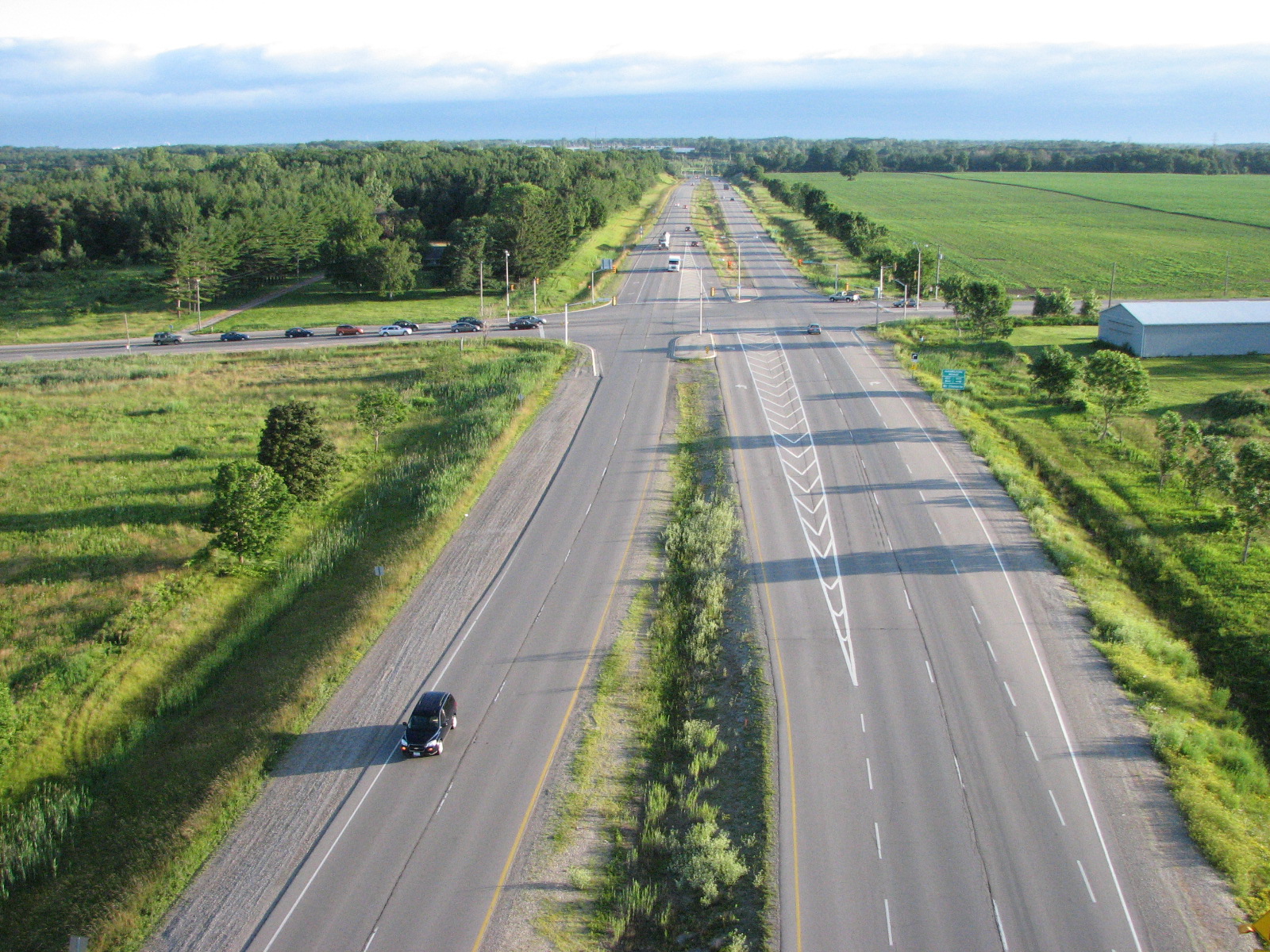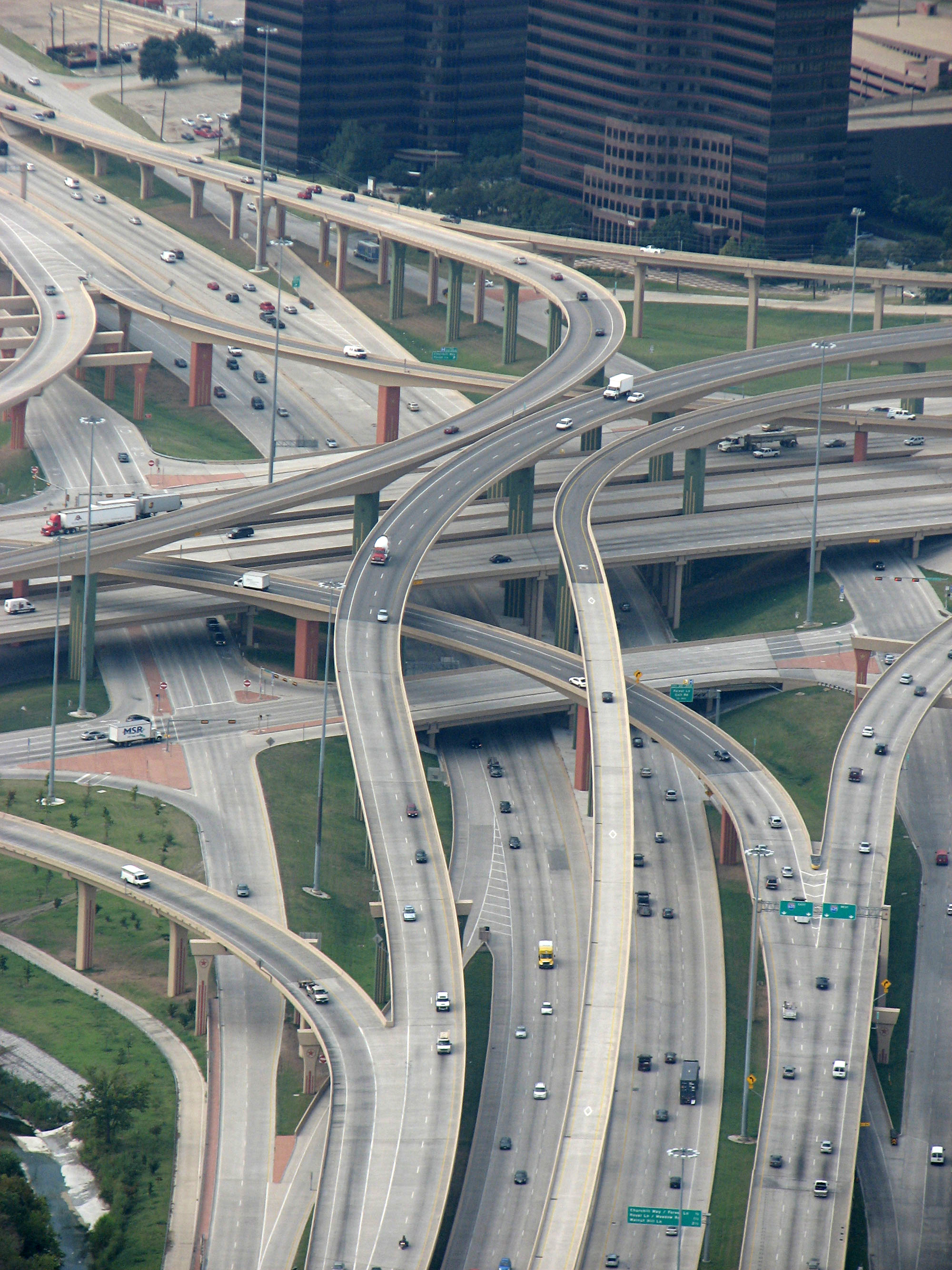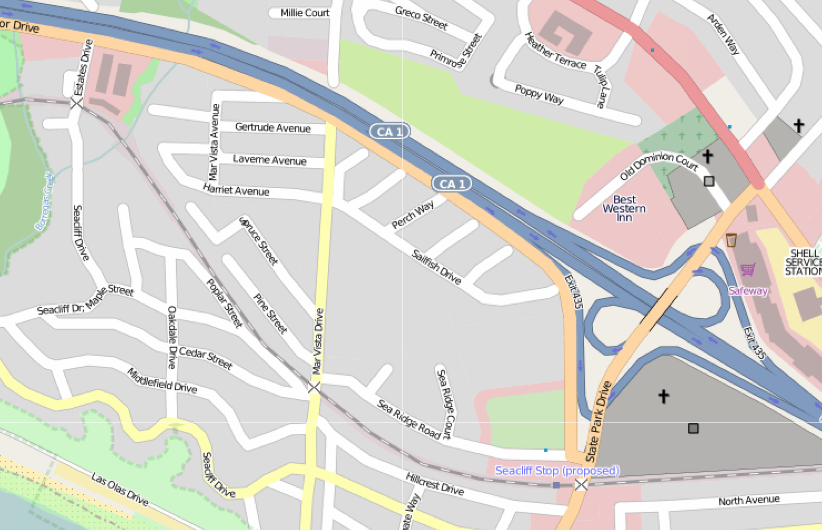|
State Route 400 (Georgia)
Georgia State Route 400 (SR 400; commonly known as Georgia 400) is a freeway and state highway in the U.S. state of Georgia serving parts of Metro Atlanta. It is concurrent with U.S. Route 19 (US 19) from exit 4 ( Interstate 285) until its northern terminus south-southeast of Dahlonega, linking the city of Atlanta to its north-central suburbs and exurbs. SR 400 travels from the Lindbergh neighborhood in the Buckhead district of Atlanta, at Interstate 85 (I-85), to just south-southeast of Dahlonega. Like the Interstate highways, it is a limited-access road (with interchanges instead of intersections), but unlike the interstates (which were renumbered by GDOT in 2000), the exit numbers are not mileage-based, they are sequential. Once SR 400 passes exit 17 ( SR 306), it changes from a limited-access freeway into an at-grade divided highway with traffic lights, but still with a high speed limit of , and ends at the J.B. Jones I ... [...More Info...] [...Related Items...] OR: [Wikipedia] [Google] [Baidu] |
Buckhead, Atlanta
Buckhead is the wikt:uptown, uptown commercial and residential district of the city of Atlanta, Georgia (U.S. state), Georgia, comprising approximately the northernmost fifth of the city. Buckhead is the third largest business district within the Atlanta city limits, behind Downtown Atlanta, Downtown and Midtown Atlanta, Midtown, a major commercial and financial center of the Southern United States, Southeast. Buckhead is anchored by a core of High-rise building, high-rise office buildings, hotels, shopping centers, restaurants and condominiums centered around the intersection of Peachtree Street, Peachtree Road and Georgia State Route 237, Piedmont Road near Georgia State Route 400, the Buckhead station, Buckhead MARTA station, and Lenox Square. History In 1838, Henry Irby purchased 202 1/2 acres surrounding the present intersection of Peachtree, Roswell, and West Paces Ferry roads from Daniel Johnson for $650. Irby subsequently established a general store and tavern at the nort ... [...More Info...] [...Related Items...] OR: [Wikipedia] [Google] [Baidu] |
Exurb
An exurb (or alternately: exurban area) is an area outside the typically denser inner suburban area, at the edge of a metropolitan area, which has some economic and commuting connection to the metro area, low housing density, and growth. It shapes an interface between urban and rural landscapes holding a limited urban nature for its functional, economic, and social interaction with the urban center, due to its dominant residential character. They consist of "agglomerations of housing and jobs outside the municipal boundaries of a primary city" and beyond the surrounding suburbs. Definitions The word ''exurb'' (a portmanteau of ''extra (outside)'' and ''urban'') was coined by Auguste Comte Spectorsky, in his 1955 book ''The Exurbanites'', to describe the ring of prosperous communities beyond the suburbs, that are commuter towns for an urban area. In other uses the term has expanded to include popular extraurban districts which nonetheless may have poor transportation and under ... [...More Info...] [...Related Items...] OR: [Wikipedia] [Google] [Baidu] |
Traffic Light
Traffic lights, traffic signals, or stoplights – known also as robots in South Africa are signalling devices positioned at intersection (road), road intersections, pedestrian crossings, and other locations in order to control flows of traffic. Traffic lights consist normally of three signals, transmitting meaningful information to drivers and riders through colours and symbols including arrows and bicycles. The regular traffic light colours are red, yellow, and green arranged vertically or horizontally in that order. Although this is internationally standardised,1968, as revised 1995 and 2006Vienna Convention on Road Signs and Signals United Nations Publication ECE/TRANS/196. ISBN 978-92-1-116973-7. URL Accessed: 7 January 2022. variations exist on national and local scales as to traffic light sequences and laws. The method was first introduced in December 1868 on Parliament Square in London to reduce the need for police officers to control traffic. Since then, electricity ... [...More Info...] [...Related Items...] OR: [Wikipedia] [Google] [Baidu] |
Dual Carriageway
A dual carriageway ( BE) or divided highway ( AE) is a class of highway with carriageways for traffic travelling in opposite directions separated by a central reservation (BrE) or median (AmE). Roads with two or more carriageways which are designed to higher standards with controlled access are generally classed as motorways, freeways, etc., rather than dual carriageways. A road without a central reservation is a single carriageway regardless of the number of lanes. Dual carriageways have improved road traffic safety over single carriageways and typically have higher speed limits as a result. In some places, express lanes and local/collector lanes are used within a local-express-lane system to provide more capacity and to smooth traffic flows for longer-distance travel. History A very early (perhaps the first) example of a dual carriageway was the ''Via Portuensis'', built in the first century by the Roman emperor Claudius between Rome and its port Ostia at the mouth of t ... [...More Info...] [...Related Items...] OR: [Wikipedia] [Google] [Baidu] |
Intersection (road)
An intersection or an at-grade junction is a junction where two or more roads converge, diverge, meet or cross at the same height, as opposed to an interchange, which uses bridges or tunnels to separate different roads. Major intersections are often delineated by gores and may be classified by road segments, traffic controls and lane design. Types Road segments One way to classify intersections is by the number of road segments (arms) that are involved. * A three-way intersection is a junction between three road segments (arms): a T junction when two arms form one road, or a Y junction, the latter also known as a fork if approached from the stem of the Y. * A four-way intersection, or crossroads, usually involves a crossing over of two streets or roads. In areas where there are blocks and in some other cases, the crossing streets or roads are perpendicular to each other. However, two roads may cross at a different angle. In a few cases, the junction of two road segments ... [...More Info...] [...Related Items...] OR: [Wikipedia] [Google] [Baidu] |
Georgia State Route 306
State Route 306 (SR 306) is a west-to-east state route located entirely in Forsyth County, Georgia. The route connects Cumming, the county seat in central Forsyth County, with the northeastern portion of the county, which is bordered to the east by Lake Lanier, and Gainesville, located east of the lake in Hall County. Route description From its western terminus at SR 20 northwest of Cumming, the route, locally known as Sawnee Drive for this portion, runs west to meet SR 9 just north of downtown Cumming, connecting SR 20 and SR 9 without having to travel through the heart of Cumming. SR 306 and SR 9 are then co-signed on their way northeast toward the community of Coal Mountain, before SR 306 departs SR 9 and travels to the east to its interchange with US 19/ SR 400 at exit 17, which is the northernmost interchange of SR 400's controlled access portion. SR 306 continues northeast, now known as Keith Bridge Ro ... [...More Info...] [...Related Items...] OR: [Wikipedia] [Google] [Baidu] |
Sequential Exit Numbering
An exit number is a number assigned to a road junction, usually an exit from a freeway. It is usually marked on the same sign as the destinations of the exit. In some countries, such as the United States, it is also marked on a sign in the gore. Exit numbers typically reset at political borders such as state lines. Some non-freeways use exit numbers. Typically these are rural roads built to expressway standards, and either only the actual exits are numbered, or the at-grade intersections are also numbered. An extreme case of this is in New York City, where the Grand Concourse and Linden Boulevard were given sequential numbers, one per intersection (both boulevards no longer have exit numbers as of 2011). A milder version of this has been recently used on the West Side Highway, also in New York, where only the major intersections are numbered (possibly to match the planned exits on the cancelled Westway freeway). Another case is the Nanaimo Parkway in Nanaimo, British Columbi ... [...More Info...] [...Related Items...] OR: [Wikipedia] [Google] [Baidu] |
Georgia Department Of Transportation
The Georgia Department of Transportation (GDOT) is the organization in charge of developing and maintaining all state and federal roadways in the U.S. state of Georgia. In addition to highways, the department also has a limited role in developing public transportation and general aviation programs. GDOT is headquartered in downtown Atlanta and is part of the executive branch of state government. GDOT has broken up the state of Georgia into seven districts in order to facilitate regional development. Each district is responsible for the planning, design, construction, and maintenance of the state and federal highways in their region. History The State Highway Department was created on August 16, 1916 by an act of the Georgia General Assembly. In 1918 came the creation of the Georgia State Highway Commission, which made surveys and oversaw plans for road projects. Finally, in 1972, came the creation of the Georgia Department of Transportation by Governor Jimmy Carter. Roles and ... [...More Info...] [...Related Items...] OR: [Wikipedia] [Google] [Baidu] |
Intersection (road)
An intersection or an at-grade junction is a junction where two or more roads converge, diverge, meet or cross at the same height, as opposed to an interchange, which uses bridges or tunnels to separate different roads. Major intersections are often delineated by gores and may be classified by road segments, traffic controls and lane design. Types Road segments One way to classify intersections is by the number of road segments (arms) that are involved. * A three-way intersection is a junction between three road segments (arms): a T junction when two arms form one road, or a Y junction, the latter also known as a fork if approached from the stem of the Y. * A four-way intersection, or crossroads, usually involves a crossing over of two streets or roads. In areas where there are blocks and in some other cases, the crossing streets or roads are perpendicular to each other. However, two roads may cross at a different angle. In a few cases, the junction of two road segments ... [...More Info...] [...Related Items...] OR: [Wikipedia] [Google] [Baidu] |
Interchange (road)
In the field of road transport, an interchange (American English) or a grade-separated junction (British English) is a road junction that uses grade separations to allow for the movement of traffic between two or more roadways or highways, using a system of interconnecting roadways to permit traffic on at least one of the routes to pass through the junction without interruption from crossing traffic streams. It differs from a standard intersection, where roads cross at grade. Interchanges are almost always used when at least one road is a controlled-access highway (freeway or motorway) or a limited-access divided highway (expressway), though they are sometimes used at junctions between surface streets. Terminology ''Note:'' The descriptions of interchanges apply to countries where vehicles drive on the right side of the road. For left-side driving, the layout of junctions is mirrored. Both North American (NA) and British (UK) terminology is included. ; Freeway juncti ... [...More Info...] [...Related Items...] OR: [Wikipedia] [Google] [Baidu] |
Limited-access Road
A limited-access road, known by various terms worldwide, including limited-access highway, dual-carriageway, expressway, limited access freeway, and partial controlled access highway, is a highway or arterial road for high-speed traffic which has many or most characteristics of a controlled-access highway (also known as a ''freeway'' or ''motorway''), including limited or no access to adjacent property, some degree of Dual carriageway, separation of opposing traffic flow, use of grade separated Interchange (road), interchanges to some extent, prohibition of slow modes of transport, such as bicycles, Working animal, (draught) horses, or self-propelled agricultural machines; and very few or no intersection (road), intersecting cross-streets or level crossings. The degree of isolation from local traffic allowed varies between countries and regions. The precise definition of these terms varies by jurisdiction.''Manual on Uniform Traffic Control Devices''Section 1A.13 Definitions of ... [...More Info...] [...Related Items...] OR: [Wikipedia] [Google] [Baidu] |
Interstate Highway
The Dwight D. Eisenhower National System of Interstate and Defense Highways, commonly known as the Interstate Highway System, is a network of controlled-access highways that forms part of the National Highway System in the United States. The system extends throughout the contiguous United States and has routes in Hawaii, Alaska, and Puerto Rico. The U.S. federal government first funded roadways through the Federal Aid Road Act of 1916, and began an effort to construct a national road grid with the passage of the Federal Aid Highway Act of 1921. In 1926, the United States Numbered Highway System was established, creating the first national road numbering system for cross-country travel. The roads were still state-funded and maintained, however, and there was little in the way of national standards for road design. U.S. Highways could be anything from a two-lane country road to a major multi-lane freeway. After Dwight D. Eisenhower became president in 1953, his administration ... [...More Info...] [...Related Items...] OR: [Wikipedia] [Google] [Baidu] |


_1.jpg)



.jpg)

